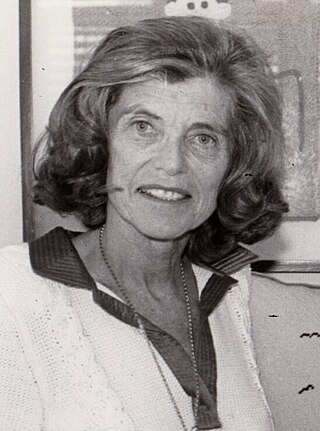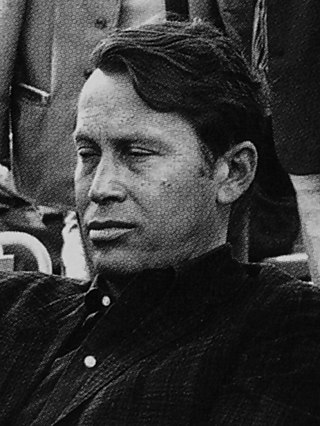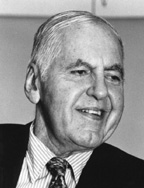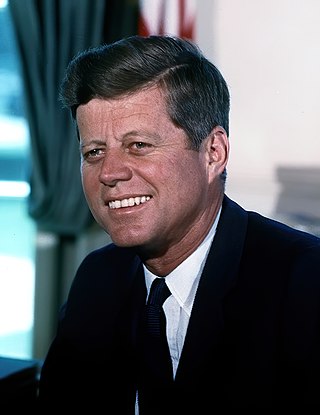Related Research Articles

Robert Lee Frost was an American poet. Known for his realistic depictions of rural life and his command of American colloquial speech, Frost frequently wrote about settings from rural life in New England in the early 20th century, using them to examine complex social and philosophical themes.

Eunice Mary Kennedy Shriver was an American philanthropist. Shriver was a member of the Kennedy family by birth, and a member of the Shriver family through her marriage to Sargent Shriver, who was the United States Ambassador to France and the final Democratic nominee for Vice President of the United States in 1972. She was a sister of U.S. President John F. Kennedy, U.S. Senators Robert F. Kennedy and Edward Kennedy, and U.S. Ambassador to Ireland Jean Kennedy Smith.

Richard Purdy Wilbur was an American poet and literary translator. One of the foremost poets, along with his friend Anthony Hecht, of the World War II generation, Wilbur's work, often employing rhyme, and composed primarily in traditional forms, was marked by its wit, charm, and gentlemanly elegance. He was acclaimed in his youth as the heir to Robert Frost, translated the verse dramas of Moliere, Corneille, and Racine into rhymed English, collaborated with Leonard Bernstein as the lyricist for the opera Candide, and in his old age acted, particularly through his role in the annual West Chester University Poetry Conference, as a mentor to the younger poets of the New Formalist movement. He was appointed the second Poet Laureate Consultant in Poetry to the Library of Congress in 1987 and received the Pulitzer Prize for Poetry twice, in 1957 and 1989.

John F. Kennedy, the 35th president of the United States, was assassinated while riding in a presidential motorcade through Dealey Plaza in Dallas, Texas, on November 22, 1963. Kennedy was in the vehicle with his wife Jacqueline, Texas governor John Connally, and Connally's wife Nellie, when he was fatally shot from the nearby Texas School Book Depository by Lee Harvey Oswald, a former U.S. Marine. The motorcade rushed to Parkland Memorial Hospital, where Kennedy was pronounced dead about 30 minutes after the shooting; Connally was also wounded in the attack but recovered. Vice President Lyndon B. Johnson was hastily sworn in as president two hours and eight minutes later aboard Air Force One at Dallas Love Field.

Archibald MacLeish was an American poet and writer, who was associated with the modernist school of poetry. MacLeish studied English at Yale University and law at Harvard University. He enlisted in and saw action during the First World War and lived in Paris in the 1920s. On returning to the United States, he contributed to Henry Luce's magazine Fortune from 1929 to 1938. For five years, MacLeish was the ninth Librarian of Congress, a post he accepted at the urging of President Franklin D. Roosevelt. From 1949 to 1962, he was Boylston Professor of Rhetoric and Oratory at Harvard. He was awarded three Pulitzer Prizes for his work.
An ad eundem degree is an academic degree awarded by one university or college to an alumnus of another, in a process often known as incorporation. The recipient of the ad eundem degree is often a faculty member at the institution which awards the degree, e.g. at the University of Cambridge, where incorporation is expressly limited to a person who "has been admitted to a University office or a Headship or a Fellowship of a College, or holds a post in the University Press ... or is a Head-elect or designate of a College".

The John F. Kennedy Presidential Library and Museum is the presidential library and museum of John Fitzgerald Kennedy (1917–1963), the 35th president of the United States (1961–1963). It is located on Columbia Point in the Dorchester neighborhood of Boston, Massachusetts, next to the University of Massachusetts at Boston, the Edward M. Kennedy Institute for the United States Senate, and the Massachusetts Archives and Commonwealth Museum. Designed by the architect I. M. Pei, the building is the official repository for original papers and correspondence of the Kennedy Administration, as well as special bodies of published and unpublished materials, such as books and papers by and about Ernest Hemingway.

This article outlines the timeline of events before, during, and after the assassination of John F. Kennedy, the 35th president of the United States.

A Dictabelt recording from a motorcycle police officer's radio microphone stuck in the open position became a key piece of evidence cited by the House Select Committee on Assassinations (HSCA) in their conclusion that there was a conspiracy behind the assassination of John F. Kennedy on November 22, 1963. Made on a common Dictaphone-brand dictation machine that recorded sound in grooves pressed into a thin vinyl-plastic belt, the recording gained prominence among Kennedy assassination conspiracy theorists following the HSCA's 1978 conclusion, based in part on this evidence, that there was a "high probability" that Lee Harvey Oswald did not act alone and that the Kennedy assassination was the result of a conspiracy.

In Western popular culture, the Chinese word for crisis is often incorrectly said to comprise two Chinese characters meaning 'danger' and 'opportunity'. The second character is a component of the Chinese word for opportunity, but has multiple meanings, and in isolation means something more like 'change point' or inflection point. The mistaken etymology became a trope after it was used by John F. Kennedy in his presidential campaign speeches and has been widely repeated in business, education, politics and the press in the United States.

The Profile in Courage Award is a private award created by the Kennedy family to recognize displays of courage similar to those John F. Kennedy originally described in his book of the same name. It is given to individuals who, by acting in accord with their conscience, risked their careers or lives by pursuing a larger vision of the national, state or local interest in opposition to popular opinion or pressure from constituents or other local interests.

William Morris Meredith Jr. was an American poet and educator. He was Poet Laureate Consultant in Poetry to the Library of Congress from 1978 to 1980, and the recipient of the 1988 Pulitzer Prize for Poetry.
The Poetry Society of America is a literary organization founded in 1910 by poets, editors, and artists. It is the oldest poetry organization in the United States. Past members of the society have included such renowned poets as Witter Bynner, Robert Frost, Langston Hughes, Edna St. Vincent Millay, Marianne Moore, and Wallace Stevens.

John Fitzgerald Kennedy, also known as JFK, was the 35th president of the United States, serving from 1961 until his assassination in 1963. He was the youngest person elected president at 43 years. Kennedy served at the height of the Cold War, and the majority of his foreign policy concerned relations with the Soviet Union and Cuba. A Democrat, Kennedy represented Massachusetts in both houses of the United States Congress prior to his presidency.

The Massachusetts Review is a literary quarterly founded in 1959 by a group of professors from Amherst College, Mount Holyoke College, Smith College, and the University of Massachusetts Amherst. It receives financial support from Five Colleges, Inc., a consortium which includes Amherst College and four other educational institutions in a short geographical radius.

Robert Francis Kennedy, also known as RFK, was an American politician and lawyer. He served as the 64th United States attorney general from January 1961 to September 1964, and as a U.S. senator from New York from January 1965 until his assassination in June 1968, when he was running for the Democratic presidential nomination. Like his brothers John F. Kennedy and Ted Kennedy, he was a prominent member of the Democratic Party and is considered an icon of modern American liberalism.

The first inauguration of Lyndon B. Johnson as the 36th president of the United States was held on Friday, November 22, 1963, aboard Air Force One at Dallas Love Field, following the assassination of President John F. Kennedy earlier that day. The inauguration – the eighth non-scheduled, extraordinary inauguration to ever take place – marked the commencement of the first term of Lyndon B. Johnson as president.

The inauguration of John F. Kennedy as the 35th president of the United States was held on Friday, January 20, 1961, at the East Portico of the United States Capitol in Washington, D.C. This was the 44th inauguration and marked the commencement of John F. Kennedy's and Lyndon B. Johnson's only term as president and vice president. Kennedy was assassinated 2 years, 306 days into this term, and Johnson succeeded to the presidency.

In the Clearing is a 1962 poetry collection by Robert Frost. It contains the poem "For John F. Kennedy His Inauguration", much of which Frost had composed to be read at President Kennedy's inauguration but could not. The book is also known for "Kitty Hawk", the book's longest poem, which muses on the Wright Brothers' accomplishment in manned flight.

"For John F. Kennedy His Inauguration" is a poem written by the American poet Robert Frost for the presidential inauguration of John F. Kennedy on January 20, 1961.
References
- ↑ United States. Congress. House. Committee on Public Works; United States. Congress. House. Committee on Public Works and Transportation (1964). John F. Kennedy Center for the Performing Arts: Hearings Before the Joint Session of the Committee on Public Works, House of Representatives, and Committee on Public Works, United States Senate, Eighty-eighth Congress, First Session. U.S. Government Printing Office. p. 26.
- ↑ Henry Hart (17 April 2017). The Life of Robert Frost: A Critical Biography. John Wiley & Son. p. 388. ISBN 978-0-470-65852-9.
- 1 2 3 "The President's Arrival". Amherst College. Archived from the original on 2019-11-05. Retrieved 30 April 2021.
- ↑ "Convocation Ceremony". Amherst College. Archived from the original on 2021-05-01. Retrieved 30 April 2021.
- ↑ "Documents". Amherst College. Archived from the original on 2019-11-05. Retrieved 30 April 2021.
- ↑ "Motorcade". Amherst College. Archived from the original on 2019-11-05. Retrieved 30 April 2021.
- ↑ "JFK - The Politician's Poetry". JFK The Last Speech. Archived from the original on 2021-05-01. Retrieved 30 April 2021.
- ↑ "Documentary on JFK's last speech to be shown at film fest". Fremont News Messenger. Retrieved 1 May 2021.
- 1 2 3 "Remarks at Amherst College on the Arts". JFK Library. Archived from the original on 2021-04-30. Retrieved 30 April 2021.